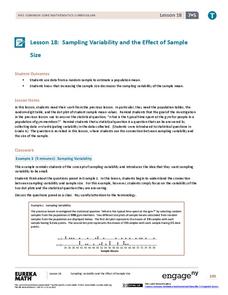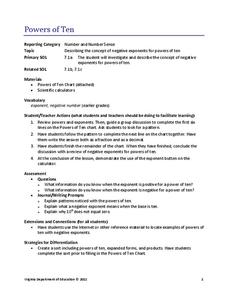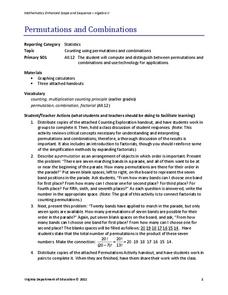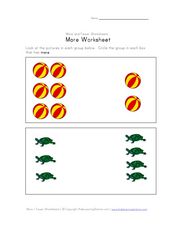EngageNY
Writing Equations Using Symbols
Build upon prior equation writing experience to create more complicated equations. Lesson one in a 33-part unit builds upon the class members' sixth and seventh grade experience of writing linear equations. Several examples...
EngageNY
Ratios of Fractions and Their Unit Rates 2
Remodeling projects require more than just a good design — they involve complex fractions, too. To determine whether a tiling project will fit within a given budget pupils calculate the square footage to determine the number of...
EngageNY
Populations, Samples, and Generalizing from a Sample to a Population
Determine the difference between a sample statistic and a population characteristic. Pupils learn about populations and samples in the 14th portion in a unit of 25. Individuals calculate information directly from populations called...
EngageNY
Sampling Variability and the Effect of Sample Size
The 19th installment in a 25-part series builds upon the sampling from the previous unit and takes a larger sample. Pupils compare the dot plots of sample means using two different sample sizes to find which one has the better variability.
EngageNY
Using Sample Data to Compare the Means of Two or More Populations
Determine whether there is a difference between two grades. Teams generate random samples of two grade levels of individuals. Groups use the mean absolute deviation to determine whether there is a meaningful difference between the...
EngageNY
Describing Distributions Using the Mean and MAD
What city has the most consistent temperatures? Pupils use the mean and mean absolute deviation to describe various data sets including the average temperature in several cities. The 10th lesson in the 22-part series asks learners to...
EngageNY
Developing a Statistical Project
The 17th lesson in a unit of 22 presents asks the class to conduct a statistics project. Pupils review the first two steps of the process of asking a question and collecting data. They then begin the process by developing a...
EngageNY
Comparing Ratios Using Ratio Tables
Decide which concentration of mixtures is the strongest. Pupils use tables to compare ratios involved in mixtures. They use two methods to make the comparisons — by finding equivalent values within the tables or by comparing the...
Curated OER
Sets Of
Represent multiplication as sets of items for beginners to this concept. They look at six familiar object sets and determine the total number of legs by counting the sets. There is some scaffolding here, as the first is done for them and...
Granite School District
Activities that Build Number Sense
Have fun while building the number sense of young mathematicians with this list of ten-frame learning games. From developing cardinality and counting skills to learning place value and basic addition strategies, ten-frames are excellent...
CCSS Math Activities
Smarter Balanced Sample Items: 7th Grade Math – Target A
How do you know if your pupils have a deep understanding of proportional relationships? Assessment is key! A helpful series starts with questions on proportional relationships modeled after the Smarter Balanced Assessment items....
Curriculum Corner
Winter Multiplication and Division Problem Solving Task Cards
A set of 18 winter-themed multiplication and division word problems is perfect for your math centers right before the holidays. Each problem is numbered and represented on a task card. Young mathematicians write their answers on a...
Charleston School District
Review Unit 2: Congruence and Similarity
Review for the test with a comprehensive list of terms and concepts for the unit on congruence and similarity. It divides divides the sections in the order of the lessons presented during the unit.
Virginia Department of Education
Powers of Ten
Investigate negative exponents of-ten. Pupils use the pattern of increasing powers of 10 to determine negative powers of 10. The scholars write the powers in expanded and product forms and make the connection to exponents using a...
CK-12 Foundation
Solving Real-World Problems Using Multi-Step Equations: Bowling Ball Delivery
How many bowling balls can a truck carry? A slider interactive changes the weight of boxes and the number of bowling balls per box. Investigating with this slider lets users find the maximum number of bowling balls.
Henrico County Public Schools
Models for Teaching Addition and Subtraction of Integers
Positive and negative numbers are everywhere in the world around us. Whether it's charged particles in atoms, a hot air balloon rising and falling in the sky, or a series of bills and checks being delivered in the mail, this...
Charleston School District
Pre-Test Unit 1: Exponents
How much do you know about exponents? The pre-test covers the concepts of integer exponents with both numerical and algebraic one-variable expressions. The test is also over representing numbers in scientific notation, operating with...
Achieve
Rabbit Food
Keep your pets slim, trim, and healthy using mathematics! Pupils use a linear programming model to optimize the amount and type of food to provide to a pet rabbit. They model constraints by graphing inequalities and use them to analyze a...
Curriculum Corner
Order of Operations Task Cards (1)
See how well learners know how to solve expressions using the order of operations. Use this packet that includes 28 task cards that requires pupils to evaluate expressions with variables, solve expressions using the correct...
Virginia Department of Education
Permutations and Combinations
Counting is not all it adds up to be — sometimes it involves multiplying. The activity introduces permutations and combinations as ways of counting, depending upon whether order is important. Pupils learn about factorials and the...
American Library Association
Even and Odd Numbers: Lesson Plans and Sample Problems
If your youngsters are new to numbers, here are several interactive strategies to get them thinking about even and odd numbers. For example, they can count the number of desks, people, etc. in the room and determine if it is even or odd....
Santillana USA
Celebra Kwanzaa
¡Celebramos Kwanzaa! Celebrate Kwanzaa through the fictional story Celebra Kwanzaa con Botitas y sus gatitos to delightfully explain the seven principles of Kwanzaa. Dual language learners participate in reading and vocabulary...
Curated OER
More or Less - Less
In this more or less worksheet, students circle the group in each problem that has less than the other group. Students complete 4 problems.
Curated OER
More Worksheet 2
In this counting and comparing numbers worksheet, students count the object pairs in 2 problems. Students identify the group in each pair that has more objects than the other.

























